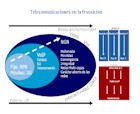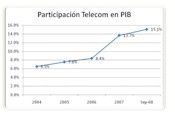| |
|
Upcoming events |
|
|
Spectrum 20/20 Symposium and
XIII Meeting of PCC.II |
|
|
One June 1, prior to the XIII PCC.II meeting, a
one-day radiocommunication symposium will be held in
Ottawa Canada.
Spectrum 20/20, organized by the Radio Advisory
Board of Canada ("RABC").
The
XIII Meeting of the Permanent Consultative
Committee II, Radiocommunications including
Broadcasting will take place in Ottawa, Canada, from
June 2 to 5, 2009. PCC.II serves as a
technical advisory body of CITEL with respect to:
coordination and harmonization of standards related
to spectrum use; stimulation and fostering of the
development of radiocommunication and broadcasting
services; assistance in planning and efficient use
of the radio spectrum and satellite orbits for radio
services including broadcasting and coordination of
regional preparations for specific ITU events, as
appropriate, including the preparation of
inter-American proposals (IAP) and common positions,
and to conduct interregional consultations in
preparation for such events.
|
|
more information |
|
|
Important issues |
|
The Inner Workings of the
Web: Discovering Who Makes the Internet Work
By Pablo Hinojosa, ICANN |
|
|
Each one of the hundreds of millions of devices
connected to the Internet, be it a computer, a
mobile telephone, a videogame, or whatever, is
equipped with a unique identification mechanism that
makes it possible to communicate to and from that
device. That identification mechanism is usually a
number, known as the IP number, which is unique to
the device and distinguishes it from all others.
|
|
more information |
|
Convergence (Part 1)
By Ignacio Luis Bergallo, Telefónica de
Argentina |
|
|
 One
of the most complex issues of the regulatory debate
on telecommunications is that legislation should be
built on an industry operating in an environment of
solid technological and commercial integration with
information services. This transformation,
generically known as convergence, tends to occur
between these industries not only because they have
a common technological matrix, but also because they
influence economic development in a similar, joint
manner. In the future, it will be difficult—if not
impossible—to differentiate their individual
influence. One
of the most complex issues of the regulatory debate
on telecommunications is that legislation should be
built on an industry operating in an environment of
solid technological and commercial integration with
information services. This transformation,
generically known as convergence, tends to occur
between these industries not only because they have
a common technological matrix, but also because they
influence economic development in a similar, joint
manner. In the future, it will be difficult—if not
impossible—to differentiate their individual
influence. |
|
more information |
|
Policies
applied in the Dominican Republic to expand
telecommunications and achieve inclusion
By Edwin San Román, International Consultant
of INDOTEL |
|
|
 Telecommunications has become an
essential basic service –equal in importance to
water, electricity and health. It plays a key role
in the economic and social development of nations,
and is the ideal tool to achieve inclusion and
democratize people’s access to the digital society
of the 21st century. Telecommunications has become an
essential basic service –equal in importance to
water, electricity and health. It plays a key role
in the economic and social development of nations,
and is the ideal tool to achieve inclusion and
democratize people’s access to the digital society
of the 21st century.
Within this context, the
Instituto Dominicano de las Telecomunicaciones,
following the explicit directive by President Leonel
Fernández Reyna, has set out to aim its actions and
activities to grant the opportunity to all
Dominicans, with no exceptions, to access
telecommunication services, regardless of their
economic condition or geographical location.
|
|
more information |
|
|
Training |
|
Digital Signature
By Néstor Pisciota, Coordinator, Universidad
Blas Pascal |
|
|
The symmetrical algorithms have
only one key that is used for encrypt and decrypt.
The key length gives the strength of the symmetric
algorithms. Let’s imagine the example of the key of
a padlock. If someone has to guess the shape of the
key without having any clues, the longer the key,
the better. It will have more variability of teeth
and cracks. It is the same with the informatics
concept: the longer the keys are (more bits), the
safer it is. |
|
more information |
|
Program of scholarships in
telecommunications for 2009
By Carol Dolinkas, General Coordination of
Human Resources Development of CITEL |
|
|
Please find below the preliminary program of courses
in telecommunications with scholarships of OAS/CITEL
for 2009. |
|
more information |
|
|
What's happening in the
region? |
|
|
Colombia: Telecommunication sector grows, earning
income amounting to US$21.9 billion in 2008 |
|
|
Colombia achieved earnings amounting to US$21.92
billion in the telecommunication sector and
continues to record high growth rates, mainly owing
to the mass provision of mobile telephony services
and Internet access, according to the
Telecommunication Sector Report for 2008 presented
today by the Minister of Communications, María del
Rosario Guerra, along with the Director of the
Telecommunication Regulatory Commission, Christian
Lizcano. (Ministry of Communications, 29 April 2009) |
|
more information |
|
|
Brazil: has eight cell phones for every ten
inhabitants |
|
|
Brazil has reached the figure of 153,673,139
subscribers to personal mobile phone service, with
1,308,153 new connections (amounting to a growth
rate of 0.86%) in March 2009. Of total access in the
country, 125,415,158 (81.61%) are prepaid services
and 28,257,981 (18.39%) are postpaid services. (Anatel,
23 April 2009) |
|
more information |
|
|
Colombia: Mincomunicaciones publishes resolution
on the radio spectrum |
|
|
The Ministry of Communications has published the
resolution whereby the radio spectrum frequency band
between 2500 and 2690 is assigned and reserved for
terrestrial fixed and mobile radiocommunication.
Concession and license holders who are currently
operating these telecommunication networks, systems
and services must suspend all emissions and
operations on these frequency bands within 10
months, at the latest, as of the entry into force of
Resolution 000909 of 2008. (Ministry of
Communications, 20 April 2009) |
|
more information |
|
|
Colombia: Mincomunicaciones delivers radio
communication equipment for emergency and disaster
relief |
|
|
The Ministry of Communications delivered radio
communication equipment today to the various relief
institutions for emergency and disaster situations
in the country’s territory. (Ministry of
Communications, 15 April 2009) |
|
more information |
|
|
Brazil: Anatel calls for higher-quality cell
phone service |
|
|
On April 17, 2009, the National Telecommunication
Agency (Agência Nacional de Telecomunicações—Anatel)
is promoting holding a meeting with the presidents
of personal mobile phone service providers for the
purpose of reducing the rates of service
interruption and complaints regarding service
quality. To this end, the Superintendency of Private
Services (Superintendência de Serviços Privados—SPV)
shall identify the problems of each provider in
order to find a planned solution for the Brazilian
telecommunication system. (Anatel, 17 April 2009) |
|
more information |
|
|
Brazil: Anatel regulates broadband over power
line (BPL) |
|
|
On April 13, 2009, the National Telecommunication
Agency (Agência Nacional de Telecomunicações—Anatel)
published Resolution 527, which adopted the
Regulations on the Conditions of Use of Radio
Frequencies by Broadband over Power Line (BPL)
Systems. The document lays down the technical
criteria and parameters that enable use of this
technology compatible with radio communication
applications that use the radio frequency on the
band between 1,705 kHz and 50 MHz. On the basis of
these rules, Anatel allows new technologies to be
used for the benefit of society by means of the
shared use of the electromagnetic spectrum, as
available electric power distribution networks have
widespread penetration throughout Brazil’s
territory. (Anatel, 13 April 2009) |
|
more information |
|
|
Chile: MTT starts bidding process to increase
competition in third-generation (3g) mobile
telephony |
|
|
In line with what was announced by the Government,
the invitation to participate in the public bidding
process that will be awarding new concessions for
the provision of 3G advanced digital mobile
telephony service was published today in the
Official Register. Third-generation mobile service
makes it possible not only to communicate by voice
but also to have access to Internet, and therefore
it is yet another option for users who require
connectivity. (Subtel, 1 April 2009) |
|
more
information |
|
|
New Associate Members of CITEL |
|
|
EL Salvador: ERICSSON EL SALVADOR |
|
|
On March
27, 2009
ERICSSON EL SALVADOR
became an associate
member of PCC.I and PCC.II.
Ericsson is a world-leading provider of
telecommunications equipment and related services to
mobile and fixed network operators globally. Over
1,000 networks in more than 175 countries utilize
our network equipment and 40 percent of all mobile
calls are made through our systems. We are one of
the few companies worldwide that can offer
end-to-end solutions for all major mobile
communication standards. |
|

 One
of the most complex issues of the regulatory debate
on telecommunications is that legislation should be
built on an industry operating in an environment of
solid technological and commercial integration with
information services. This transformation,
generically known as convergence, tends to occur
between these industries not only because they have
a common technological matrix, but also because they
influence economic development in a similar, joint
manner. In the future, it will be difficult—if not
impossible—to differentiate their individual
influence.
One
of the most complex issues of the regulatory debate
on telecommunications is that legislation should be
built on an industry operating in an environment of
solid technological and commercial integration with
information services. This transformation,
generically known as convergence, tends to occur
between these industries not only because they have
a common technological matrix, but also because they
influence economic development in a similar, joint
manner. In the future, it will be difficult—if not
impossible—to differentiate their individual
influence. Telecommunications has become an
essential basic service –equal in importance to
water, electricity and health. It plays a key role
in the economic and social development of nations,
and is the ideal tool to achieve inclusion and
democratize people’s access to the digital society
of the 21st century.
Telecommunications has become an
essential basic service –equal in importance to
water, electricity and health. It plays a key role
in the economic and social development of nations,
and is the ideal tool to achieve inclusion and
democratize people’s access to the digital society
of the 21st century.